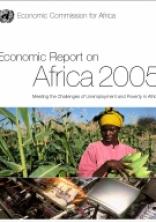Economic Report on Africa 2005

Poverty in Africa is substantially higher than in other developing regions. More enigmatic is that poverty on the continent is chronic and rising. At 46 per cent, the share of the total population living on less than $1 a day threshold is higher than in the 1980s and 1990s- this despite significant improvements in the growth of African GDP in recent years. The implication: poverty has been unresponsive to economic growth. Underlying this trend is the fact that most people have no jobs or secure sources of income.
Various reasons have been given for Africa’s lack of response of poverty to economic growth. First is the inadequacy of the growth rate. African countries need to grow by an estimated 7 per cent a year to reduce poverty enough to achieve the first Millennium Development Goal of halving the number of poor people by 2015. This growth is far higher than the average of nearly 4 per cent witnessed in the last decade.
Prerequisites for creating decent employment include the transformation of African economies from low productivity traditional agriculture to high value agriculture and agroprocessing- and to the growing industrial and services sectors, taking advantage of the opportunities presented by globalization. Political leadership is required in order to prioritize broad-based employment creation in national development programmes, including poverty reduction strategies.